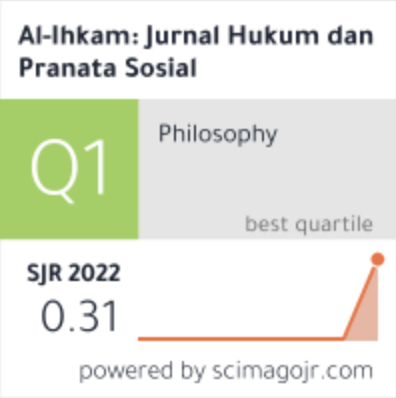Women on The Text According To Amina Wadud Muhsin in Qur’an and Women
 Abstract views: 754
,
Abstract views: 754
,
 PDF downloads: 535
PDF downloads: 535
Abstract
This article explains hermeneutic concept of Amina Wadud stating that men and women are equal. It is based on the interpretation of both Qur'anic keywords (nafs, min and azwaj) and Qur'anic concepts (qiwamah, angel and nusyuz). Wadud reasoned that those key words and concepts were, unfortunately, red partially by most of commentators and resulted gender biased exegetical works. Using the method of descriptive and critical, this article aims to elaborate how Wadud argued against the pathriarcal exegesis of the Qur’an in her book, Qur’an and Women. At the conclusion, it is found that Wadud criticized the biased works using two steps of hermeneutical approach. The first is by examining on how The Qur’an mentions some relating issues and second is by creating generalization on special respons about historical background
Downloads
References
Andiani, Asna. “Konsep Penciptaan Perempuan: Studi Atas Pemikiran Amina Wadud dalam Buku Qur’an And Woman” Kontemplasi, Vol. 01 No. 02 (November 2013).
al-'Asqalânî, Ibn Hajar. 1993. Fathu al-Bârî, Vol. 2. Beirut: Dâr al-Fikr.
A'la, Abd. 2003. Dari Neo Modernisme ke Islam Liberal. Jakarta: Paramadina.
Baz, Ibn. 1988. Majmû’ al-Fatâwâ, Vol. 1. Beirût: Dâr al-Qalâm.
al-Bâqi’, Muhammad Fuâd ‘Abd. 1992. Mu’jamu al-Mufahrâs li Alfâzhi al-Qur’â}n. Kairo: Dâr al-Fikr.
Dewi, Ernita. “Pemikiran Amina Wadud tentang Rekonstruksi Penafsiran BerbasisMetode Hermeneutik”. Substantia, Vol. 15, No. 2 (October 2013).
Engineer, Asghar Ali. 1992. The Right of Women in Islam. Lahore: Vanguard Books (PVT) LTD.
el-Fadl, Khaled Abou. 2004. Atas Nama Tuhan.Jakarta: Serambi,
¬---------------------------, Melawan Tentara Tuhan: Yang Berwenang dan Yang Sewenang-wenang, transl. Kurniawan Abdullah. Jakarta: Serambi, 2003.
Fakih, Mansour (dkk). 2000. Membincang Feminisme, Diskursus Gender dalam Perspektif Islam. Surabaya: Risalah Gusti.
Irsyadunnas. “Tafsir Ayat-Ayat Gender Ala Amina Wadud Perspektif Hermeneutika Gadamer”. Musâwa, Vol. 14, No. 2 (July 2015).
Kurzman, Charles (ed.). 1998. Liberal Islam. New York: Oxford University.
------------------------, 2001. Wacana Islam Liberal, Pemikiran Islam Kontemporer Tentang Isu-Isu Global, transl. Bahrul Ulum and Heri Junaedi. Jakarta: Paramadina.
Lihardson, Alan (Ed.). 1969. Dictionary of Christian Theology. London: SCM Press.
Mannheim, Karl. 1991. Ideologi dan Utopia, Menyingkap Kaitan Pikiran dan Politik, transl. F. Budi Hardiman. Yogyakarta: Kanisius, 1991.
Mustaqim, Abdul dan Sahiron Syamsuddin (eds.). 2002. Studi al-Qur'an Kontemporer. Yogyakarta: Tiara Wacana.
Mutrofin.“Kesetaraan Gender dalam Pandangan Amina Wadud dan Riffat Hasan”. Teosofi: Jurnal Tasawuf dan Pemikiran Islam, Vol. 3 No. 1 (June 2013).
Nasr, Sayyed Hossein. 1967. Islamic Studies: Essay on Law and Society. Beirut: Libreirie Du Liban.
Nuryanto, M. Agus. 2001. Islam, Teologi Pembebasan dan Kesetaraan Gender: Studi atas Pemikiran Asghar Ali Engineer. Yogyakarta: UII Press.
Rahman, Fazlur. 1995. Islam dan Modernitas tentang Transformasi Intelektual. Bandung: Pustaka.
--------------------, 1987. Metode dan Alternatif Neomodernisme Islam. Bandung: Mizan.
Saenong, Ilham B. 2002. Hermeneutika Pembebasan: Metodologi Tafsir al-Qur’an Menurut Hasan Hanafi. Jakarta: Teraju, 2002.
Saidah, Nor. “Bidadari dalam Konstruksi Tafsir al-Qur’an: Analisis Gender atas Pemikiran Amina Wadud Muhsin dalam Penafsiran al-Qur’an”. PALASTREN, Vol. 6, No. 2 (December 2013).
Shâwî, Ahmad.Tafsîr Shâwî, Vol. 4. Ttp: Dâru Ihyâ' Kutubi al-Arabiyyah, tt.
Soleh, A.Khudori. 2003. Pemikiran Islam Kontemporer. Yogyakarta: Jendela, 2003.
Syahrûr, Muhammad. 1990. Dirâsât Islâmiyah Mu'ashirah, Nahwa Ushûl al-Jadîdah li al-Fiqh al-Islâmî. Damaskus: al-Ahâli.
al-Thabârî, Abû Ja’far bin Jarîr. 2007. Tafsîr al-Thabârî, Vol. 9, Vol. II. Beirût: Dâr al-Salâm.
Tim Risalah Gusti (ed.). 2000. Membincang Feminisme; Diskursus Gender Perspektif Gender. Surabaya: Risalah Gusti.
Wadud Muhsin, Amina. 2008. Inside the Gender Jihad, Women's Reform in Islam. England: Oneworld Publications, 2008.
-------------------------------, Qur'an and Women. Kuala Lumpur: Fajar Bakti Sdn Bdn, 1994.
Zayd, Nasr Hamd Abu. 2004. Dawâir al-Khawf: Qirâatu 'alâ Khitâbi al-Mar'ah, Vol. III. Beirut: Dâr al-Baidla'.
In order to be accepted and published by Al-Ihkam: Jurnal Hukum dan Pranata Sosial, author(s) submitting the article manuscript should complete all the review stages. By submitting the manuscript, the author(s) agreed to the following terms:
- The copyright of received articles shall be assigned to Al-Ihkam: Jurnal Hukum dan Pranata Sosial as the publisher of the journal. The intended copyright includes the right to publish articles in various forms (including reprints). Al-Ihkam: Jurnal Hukum dan Pranata Sosial maintain the publishing rights to the published articles.
- Authors are permitted to disseminate published articles by sharing the link/DOI of the article at Al-Ihkam: Jurnal Hukum dan Pranata Sosial. Authors are allowed to use their articles for any legal purposes deemed necessary without written permission from Al-Ihkam: Jurnal Hukum dan Pranata Sosial with an acknowledgment of initial publication to this journal.
- Users/public use of this website will be licensed to CC-BY-SA.



.png)
_1.png)










